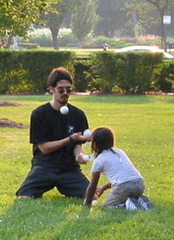Two young girls approached me. You turn down dozens of kids like them a day. The deep black eyes staring at you. Their dirty fingers gripping yours. They plead and they beg. And you say, No. Shake your head. And pretend to have no money. You have money. More than they could dream of, but not enough for all of them. So you turn down most. I found myself unable to this time, unable to resist their cute pleading voices and faces, found a bracelet I liked and let them tie it around my wrist.
I sit and read. Two kids sit on the steps outside the door. Sometimes they look over. Sometimes I avoid eye contact. I don’t want them to come over, to be forced to say no again. Almost in shame, I bury my eyes deeper into my book. Like many tourists, backpackers, and travelers, I’m tired of reality intruding on my vacation.
It reminds me of the mobs of kids in Mali, twenty or thirty kids swarming you at every village. Sometimes not asking for anything, just grabbing your hand and following you around, tiny fingers fighting for any part of you that they can grab. I think of the kids at Angkor Wat. You buy one bracelet and suddenly a dozen desperate faces peer up at you, until you can barely fight your way from the crowd to the next ancient temple demanding your attention, demanding you turn away from flesh and blood.
It’s easy to get annoyed at the constant begging. You often get frustrated and perhaps turn away more rudely, more forcefully than you should. I remember one of my first weekends in Sierra Leone. I was tired from work and heading into the market. Someone began nudging me from behind, asking for money. I shrug him off and turn around, annoyed at the intrusion of my physical space. I turned and stared at a young boy, probably no more than 12 or 13, holding up the two stumps left where his hands used to be. He must have been no more than 6 or 7 when they were hacked off. His hands final farewell, before they fell to the chopping block, probably the mocking RUF question, “short sleeve or long sleeve?”
In Mali, a friend of mine and I talked about cultural differences, where the child may simply not understand someone with wealth not sharing it. The community ethos, or communitarian spirit was so much stronger. It was natural to share whatever you had. A group of kids approached us asking for money. Their cloths ragged and torn. Bare feet against the dirty ground of Segou. The Niger River cutting its way through the sweeping desert hills. We replied by asking them for money. They took out what few coins they had, held it out in their tiny, dirt-caked palms, and offered it to us.








